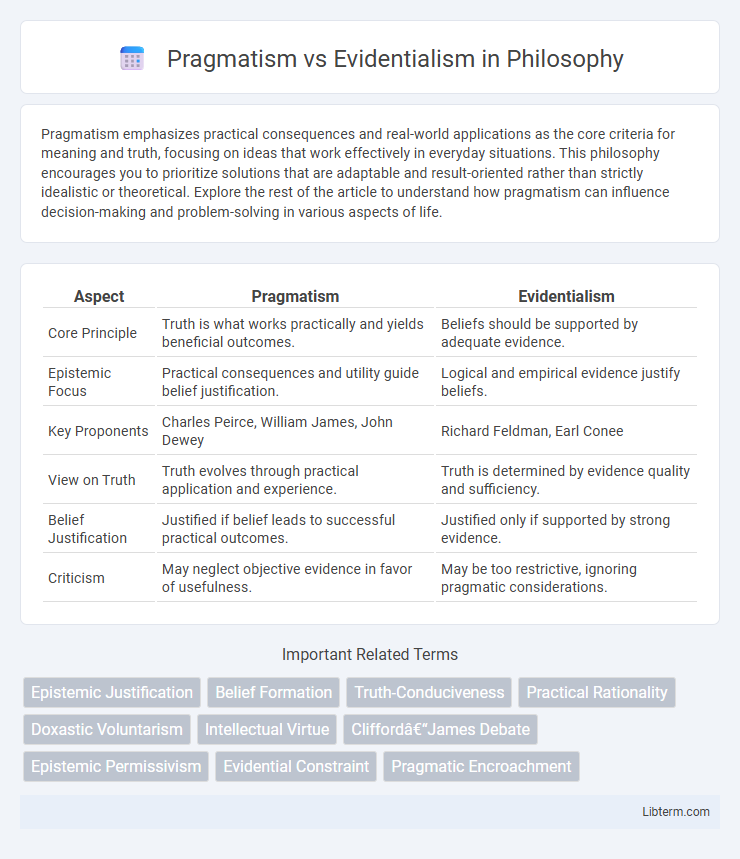Pragmatism emphasizes practical consequences and real-world applications as the core criteria for meaning and truth, focusing on ideas that work effectively in everyday situations. This philosophy encourages you to prioritize solutions that are adaptable and result-oriented rather than strictly idealistic or theoretical. Explore the rest of the article to understand how pragmatism can influence decision-making and problem-solving in various aspects of life.
Table of Comparison
| Aspect | Pragmatism | Evidentialism |
|---|---|---|
| Core Principle | Truth is what works practically and yields beneficial outcomes. | Beliefs should be supported by adequate evidence. |
| Epistemic Focus | Practical consequences and utility guide belief justification. | Logical and empirical evidence justify beliefs. |
| Key Proponents | Charles Peirce, William James, John Dewey | Richard Feldman, Earl Conee |
| View on Truth | Truth evolves through practical application and experience. | Truth is determined by evidence quality and sufficiency. |
| Belief Justification | Justified if belief leads to successful practical outcomes. | Justified only if supported by strong evidence. |
| Criticism | May neglect objective evidence in favor of usefulness. | May be too restrictive, ignoring pragmatic considerations. |
Introduction to Pragmatism and Evidentialism
Pragmatism, rooted in the works of Charles Peirce and William James, emphasizes the practical consequences of beliefs as the key criterion for their truth and justification. Evidentialism, championed by philosophers like Richard Feldman and Earl Conee, holds that beliefs are justified only when supported by sufficient and relevant evidence. These contrasting epistemological frameworks fundamentally differ in how they determine the justification and rationality of beliefs.
Historical Origins of Pragmatism
Pragmatism originated in the late 19th century through the work of Charles Sanders Peirce, William James, and John Dewey, emphasizing the practical consequences of beliefs as a key to their truth. This philosophical movement arose as a response to abstract metaphysical theories, advocating that the meaning of ideas is rooted in their observable effects and utility. Evidence-based epistemology, or evidentialism, developed concurrently but focuses strictly on justification through empirical evidence rather than practical outcomes.
Historical Roots of Evidentialism
Evidentialism, rooted in the 19th-century works of philosophers like William Clifford and Charles Sanders Peirce, emphasizes belief formation strictly based on evidence, contrasting with Pragmatism's focus on practical consequences. Clifford's essay "The Ethics of Belief" (1877) strongly advocates that beliefs must be justified by sufficient evidence to be morally responsible. Peirce's development of scientific inquiry principles further solidified evidentialism, shaping epistemology through rigorous demand for evidence in the justification of knowledge claims.
Core Principles of Pragmatism
Pragmatism centers on the principle that the truth of a belief is determined by its practical consequences and usefulness in real-world applications. It emphasizes problem-solving, adaptability, and the dynamic nature of knowledge, suggesting that beliefs are verified through their effectiveness in guiding action. This contrasts with evidentialism, which holds that beliefs must be justified solely by evidence without consideration of practical outcomes.
Central Tenets of Evidentialism
Evidentialism asserts that a belief is justified only if it is supported by adequate evidence, emphasizing the epistemic responsibility to align beliefs tightly with available data and facts. Central tenets include the principle that evidence provides the normative standard for belief justification and that beliefs lacking sufficient evidence are epistemically unjustified. This contrasts with pragmatism's focus on practical consequences and outcomes rather than strict evidential support.
Key Differences: Pragmatism vs Evidentialism
Pragmatism evaluates beliefs based on their practical consequences and usefulness in solving problems, whereas evidentialism insists that beliefs must be supported by sufficient and relevant evidence for justification. Pragmatism prioritizes the effectiveness of beliefs in guiding action, while evidentialism emphasizes the adherence to epistemic standards for truth and rationality. The key difference lies in pragmatism's flexible, outcome-oriented approach versus evidentialism's strict reliance on evidence as the basis for belief justification.
Strengths and Weaknesses of Pragmatism
Pragmatism's strength lies in its emphasis on practical consequences and real-world applications, allowing beliefs to be assessed based on their utility and effectiveness in solving problems. However, its weakness is the potential for subjective interpretation of outcomes, which can lead to a relativistic approach that may overlook objective evidence and logical consistency. Pragmatism's flexibility enables adaptation to changing circumstances, yet this adaptability can also result in less rigorous standards for truth compared to evidentialism's strict reliance on empirical evidence.
Strengths and Limitations of Evidentialism
Evidentialism emphasizes the importance of basing beliefs strictly on available evidence, promoting intellectual rigor and minimizing bias. This approach strengthens justification and reliability in knowledge acquisition by demanding that beliefs be proportioned to evidence. However, evidentialism faces limitations in addressing practical decision-making and situations where evidence is incomplete, requiring supplementary frameworks like pragmatism for action under uncertainty.
Pragmatism and Evidentialism in Contemporary Debates
Pragmatism in contemporary epistemology emphasizes the practical consequences and utility of beliefs as central to their justification, arguing that truth is what proves useful in inquiry and problem-solving. Evidentialism, by contrast, maintains that justification strictly depends on the evidence available, insisting that beliefs must be supported by adequate and relevant evidence regardless of practical outcomes. Current debates often explore the tension between pragmatism's flexible, outcome-oriented approach and evidentialism's rigorous, evidence-centered standard, impacting discussions on knowledge, rationality, and decision-making frameworks.
Conclusion: Reconciling Pragmatism and Evidentialism
Reconciling pragmatism and evidentialism involves recognizing that belief formation benefits from both practical consequences and empirical evidence. Pragmatism emphasizes the utility of beliefs in guiding actions, while evidentialism prioritizes the justification of beliefs through evidence. Integrating these perspectives allows for a more robust epistemological framework that respects the role of evidence without disregarding practical implications in belief acceptance.
Pragmatism Infographic

 libterm.com
libterm.com